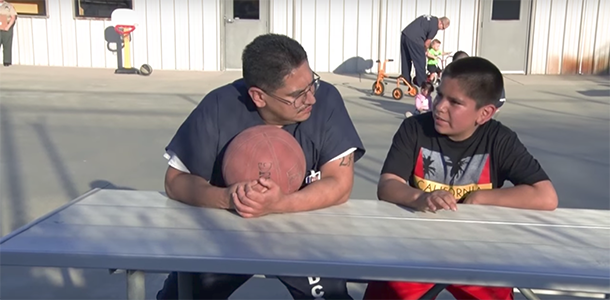
(Image from San Bernardino County Sheriff’s Department video)
Christopher Vallejo was grocery shopping when he ran into one of his former students, a student he taught at the High Desert Detention Center in Adelanto. “He had his two young sons with him, maybe five and six, and he comes up and he’s telling me how great he’s doing,” recalled Vallejo, who teaches parenting classes in San Bernardino County’s jails. “He looked healthy. He looked sober and he was working. They were happy and kind of joking around with him.”
This outcome is what San Bernardino County Sheriff’s Department strives for when inmates take classes offered through the Inmate Services Unit. The unit offers 24 classes and programs including vital classes for inmates who are parents through The Parenting Intervention Project. This project includes in-jail parenting and in-jail trauma recovery classes as well as parent-child interaction time. The classes and programs are designed to help inmates realize how their childhood traumas affected their lives, what they can do to be better parents and pave the way for successful reentry.
Dr. Laura Kamptner of California State University San Bernardino (CSUSB), along with Dr. Faith McClure, created the research-based parent education program in 2009.
“Research shows that when we can work with people to change their attitude and help them to understand themselves and help them to have empathy for their children, then we’re more likely to see long term behavior changes as opposed to a parenting class that just focuses on teaching parents punishment techniques to keep their kids in line,” said Kamptner.
The goal is to look at inmate rehabilitation holistically, according to Chris Martin, inmate programs coordinator for the San Bernardino County Sheriff. “Society has come to the conclusion that just putting these people in jail for two, three, four years and letting them sit there doing nothing and then releasing them back into society once they’re sentence is over is not helpful. So we want to look at the whole issue and break the cycles.”
Vallejo teaches the Trauma Recovery & Family Relations classes as well as directs interns, hailing from CSUSB and California Baptist University, who also teach the classes. “We want them to start reconnecting with themselves in order to have the warmth, responsiveness and empathy needed to be able to give that to their kids. We are trying to relearn this intergenerational teaching that they’ve picked up so far, but instead of passing on incarceration and abuse, we want them to pass on that warmth, responsiveness and empathy.”
The classes, offered at three of the four jails, are popular and have waiting lists to enroll. Some inmates must take the classes under court order and many others volunteer.
Once the students successfully complete 12 hours of the Trauma Recovery & Family Relations classes, they may be eligible to participate in the TALK Program, offered at two facilities. This program allows 90-minute visits between inmates and their children supervised by a clinical facilitator and interns who have been trained in developmentally appropriate practices.
Added Vallejo, “You get to see the parents, and many of them for the first time, having uninterrupted access to their kids. One individual, a father, was telling me ‘I’ve never actually spent an hour playing with my kid. I’ve been high. I’ve been running around on the street. I was on my phone, distracted in some way. This was really fun.’”
Martin recalled another successful TALK visit, saying “Last year, we had two dads who had never met their children before – they were infants. When you see these big, rough, manly men, just sobbing and holding their children for the first time, it really does give them a reason to succeed. And it gives the children their parents.”
According to Kamptner, there are few, if any, other programs like this one. “First, some jails have minimal programming. And that’s why the recidivism rate is very high. Glen Helen (Rehabilitation Center) is very unique in that respect. It’s unique in that it’s an actual class and the type of parent education class is very unique as well.”
The next step is a pilot project with the San Bernardino County Sheriff’s Department and the Probation Department. “Our goal is to have these people in our parenting class in custody, hand them over to an extension of the program in probation and continue the work that we started with them in jail,” said Kamptner.
And as Vallejo experienced, it’s important to give them the tools to successfully reenter the community: “On the most practical level, it does come down to the fact that you’re going to be in the grocery store with these individuals. Do you want them buying groceries alongside of you or do you want them waiting outside to steal yours when you walk out?”

